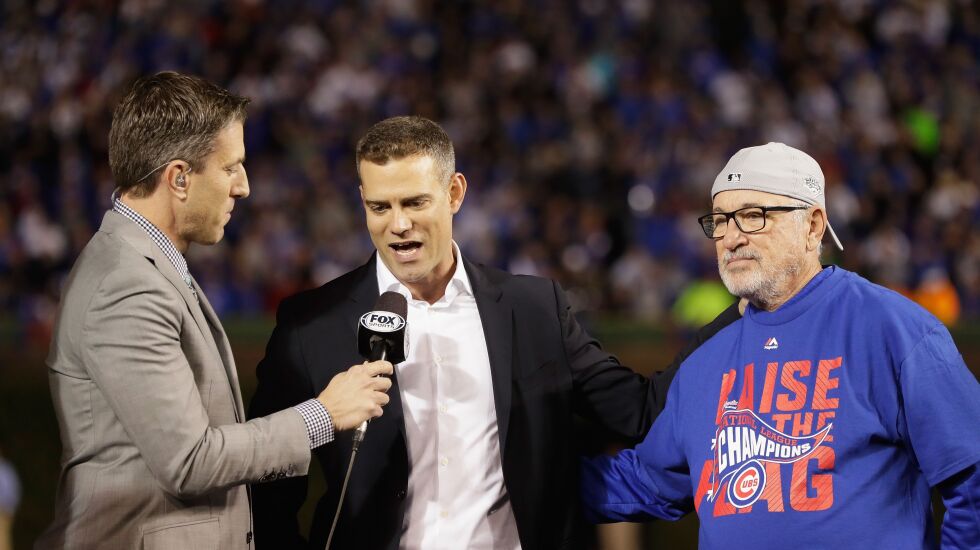
Joe Maddon wants back in a major-league dugout, but only on his terms.
The former Cubs manager is on a book tour for his memoir: ‘‘The Book of Joe.’’ For the last two seasons of his Cubs tenure, I hosted Maddon’s weekly radio show. I’ve always found him to be smart, relatable and innovative. So when I saw he was available for an interview, I jumped at the chance to get his thoughts on the state of baseball.
Maddon doesn’t like where the game is going and is trying to figure out his place in it. He left the Cubs in 2019 in part because he was disenchanted with the amount of power the Cubs’ front office exercised. A major complaint was how analytical data was relayed to players.
“I don’t like that method. I never worked under that till more recently,” Maddon said. “Even with the Cubs, the last year . . . with Theo [Epstein], it got different and at that point there I didn’t think I could be myself as a manager. And if you can’t feel that way, that authenticity, it’s really difficult to do that job.”
The irony is that before he was hired by the Cubs, Maddon was the darling of the analytics community. While managing the Tampa Bay Rays, he perfectly blended data with an old-school mentality. Now Maddon sees power being taken away from the field manager, and it has him concerned.
“I want the best analytical team in baseball, but I want them to answer to coaches and not coaches answering to people upstairs, crunching numbers,” he said.
During our 25-minute conversation, Maddon mentioned that he felt field managers were acting as “middle-managers.” It doesn’t sit right with him that in some circles, managers are merely extensions of the front office. To his point, it does seem like the era of the celebrity manager is ending, but more information should be viewed as a positive.
In today’s game, effective managers work in conjunction with the front office. An organizational approach to winning is a good thing. If done correctly, a manager should be presented with all the information he needs to be successful from game-to-game. Data is there to help a manager make the best decisions. Most of the time, managers play the odds, but every manager should feel empowered to make a call that takes into account things that can’t be quantified.
For example, pregame numbers suggest a certain pitcher for a high-leverage situation, but the manager knows the player has been dealing with a sick child at home. Maybe the pitcher isn’t in the right headspace or didn’t get enough sleep the night before. That’s where managers with people skills still can make a difference. That type of relationship with players always has been Maddon’s superpower.
Maddon feels that there is information overload and wants data presented to players in smaller doses. Not everyone agrees with that.
Free-agent shortstop Carlos Correa made a broadcasting star-turn as a postseason analyst on TBS this past weekend. In a compelling seven-minute thesis on why players should have a working knowledge of how they are being valued, Correa dazzled in explaining how more information can lead to maximum value.
“When I go into a clubhouse, right . . . the first thing I tell players is, ‘You wanna make ‘X’ amount of money?’ ’’ Correa said. “At that point, I already got them and you start explaining the analytics and how GMs think and what they look at. . . . They’re the ones giving us a contract.
“The owners, the GMs, they’re the ones making the decisions. So we gotta play to what they like, what they want to see, what they want in a player to help them win championships”
Correa believes players should be cognizant of their Weighted Runs Created Plus and their Weighted On Base Average. It was a riveting display of objective analysis infiltrating the clubhouse at a new depth.
Maddon shouldn’t fear this. He should embrace it. Marrying objective observations to subjective experience is the tightrope every team in baseball must walk. Maddon did that flawlessly with the Rays and Cubs.
There’s still room for him in the game, if he makes room for how it’s changed.







